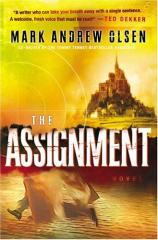The Assignment
Review
The Assignment
THE DA VINCI CODE has spawned a mini-industry of exegesis and echoes --- even tours for beguiled readers. I've read Brown's book and even written a tongue-in-cheek research piece about some of the history involved in his mystery, and I'm here to tell you my honest opinion: THE ASSIGNMENT was more interesting, more honest and more fun to read.
Like Brown, Mark Andrew Olsen bases his book on a small, secretive Roman Catholic group: the Order of St. Lazare, comprised of just seven priests. Like Brown, Olsen's protagonist is faced with a seemingly insurmountable task that involves convincing others of an impossible premise. Like Brown, Olsen's book is fast-paced and has characters careening from the States to all corners of Europe --- and, in some cases, even further. And that points to one of the things that is different about Olsen's approach. First of all, he unabashedly includes the spiritual --- he even includes the mystical, and a lot of it!
But hang on for the ride, because even though his use of several different perspectives and forms of narration (including the protagonist's diaries) can get a little confusing, Olsen uses the chaos to allow readers' suspension of their disbelief. By the novel's end, you may not consciously subscribe to the idea of angels and demons (pace Dan Brown), but you'll be cheering the former on.
In fact, one of the most interesting things about Olsen's novel, for a CBA author, is that he has structured it more as a battle of good versus evil than a battle of Christian versus nonbeliever. Conversions happen, but they aren't necessarily the "born again" kind. While not all readers will agree with Olsen's scenarios or his theology, this non-preachy yet grounded style is both refreshing and thought-provoking. What does it mean to be both a Jew and a Christian believer? What does it mean to be an academic and a believer? What does it mean to be a Catholic as opposed to a Protestant? Through a cast of characters that includes a young American graduate student, a pair of CIA officers, a post-John Paul II Pope, Mossad agents and shadowy terrorists, Olsen raises these and more questions.
Thankfully, he doesn't attempt to answer them all nor does he leave the door open (funny, since the symbol of an open door is important to the Order involved) for what could have been endless sequels (spoiler alert: if you want to know what I'm getting at, take a look at the name of the Order again).
While I could go on and on about plot twists and turns, let me end by saying something else about this book that differentiates it from THE DA VINCI CODE: at the end of THE ASSIGNMENT, for its attendant flaws, I found myself moved --- both by the outcome and by the sense of this author's living faith in God.
Reviewed by Bethanne Kelly Patrick on July 1, 2004




